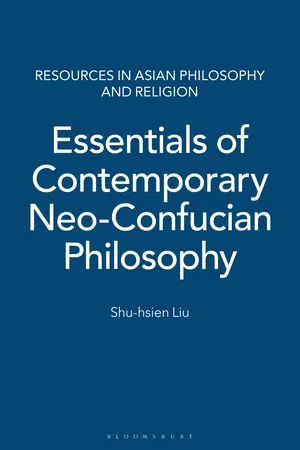
- 184 pages
- English
- PDF
- Available on iOS & Android
Essentials of Contemporary Neo-Confucian Philosophy
About this book
This volume is the follow-up to Understanding Confucian Philosophy: Classical and Sung-Ming, which presented the first two Epochs of Confucian philosophy. The third Epoch, presented in this book, is that of Contemporary Neo-Confucian philosophy. It notes a paradigm shift from the late Ming to the early Ch'ing, which shows us how the line of Sung-Ming Neo-Confucian philosophy was broken. Then, background information is given to answer the question of how the phoenix was reborn from the ashes; at the height of the iconoclast May Fourth Movement in 1919, Liang Sou-ming, the forerunner of the movement, developed his ideas about East-West cultures and their philosophies. During the darkest moments of Chinese history, three generations of New Confucian scholars developed their ideas and achieved great scholarship. Shu-hsien Liu presents a framework of four groups to portray the movement. And, the philosophies of Fung Yu-lan, Hsuing Shih-li, Thome H. Fang, T'ang Chun-I, and Mou tsung-san are reviewed and analyzed. The international dimension of the third generation of New Confucians is also introduced. In the conclusion, Shu-hsien Liu comments on the relevance of this trend of thought today with a view toward the future.
Frequently asked questions
- Essential is ideal for learners and professionals who enjoy exploring a wide range of subjects. Access the Essential Library with 800,000+ trusted titles and best-sellers across business, personal growth, and the humanities. Includes unlimited reading time and Standard Read Aloud voice.
- Complete: Perfect for advanced learners and researchers needing full, unrestricted access. Unlock 1.4M+ books across hundreds of subjects, including academic and specialized titles. The Complete Plan also includes advanced features like Premium Read Aloud and Research Assistant.
Please note we cannot support devices running on iOS 13 and Android 7 or earlier. Learn more about using the app.
Information
Table of contents
- Editor’s Note
- Preface
- Acknowledgments
- 1. Paradigm Shift in the Transitional Period from the Late Ming to the Early Ch’ing
- 2. Background for the Emergence of Contemporary New Confucianism
- 3. Fung Yu-lan’s New Learning of Principle
- 4. The Spiritual World of Hsiung Shih-li
- 5. Thomé Fang’s Grand Scheme of Comparative Philosophy
- 6. The Spiritual Spheres of T’ang Chün-i
- 7. Mou Tsung-san’s Affirmation of Intellectual Intuition
- 8. The International Dimension of the Third-Generation New Confucians
- Epilogue
- Appendix
- Bibliography
- Index